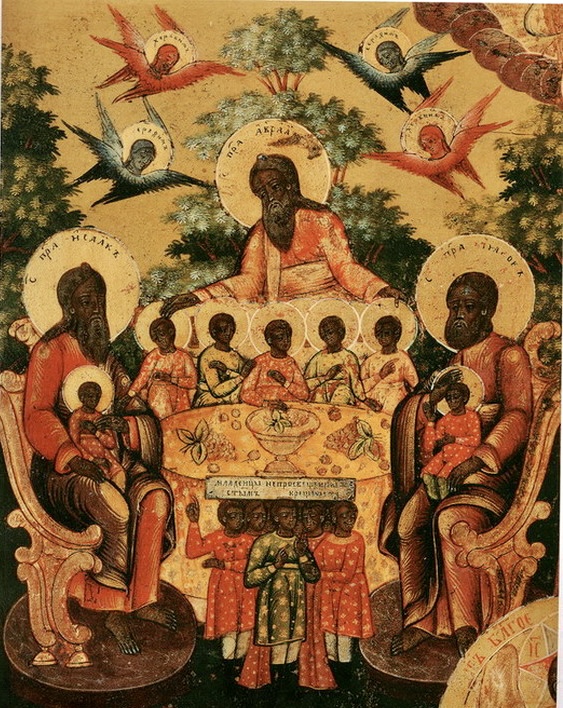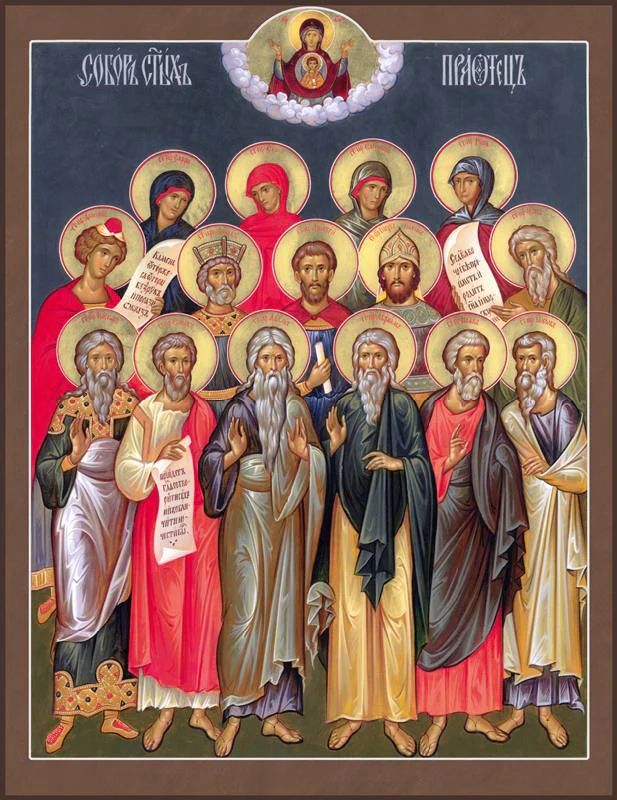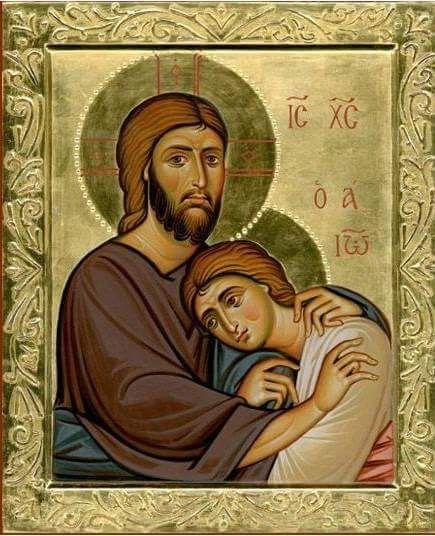Dear brothers and sisters,
Already the Sunday of the Holy Forefathers signals that we are approaching the end of the Nativity Fast, and it was heartening to hear their names during vespers in the Oratory yesterday afternoon.
“O ye faithful, let us praise today all the fathers of the old Law: Abraham, the beloved of God, and Isaac, who was born according to the promise, and Jacob and the twelve patriarchs, the most meek David, and Daniel, the prophet of desires, glorifying with them the three youths that transformed the furnace into dew, and who ask remission of Christ God, Who is glorified in His saints.”
The troparion describes these righteous forefathers of the Old Law as the sign of the Saviour’s betrothal to the Church, since it was from their line and descent that the Mother of God would blossom in the world, and through her that the Word became flesh and establish His Church, the New Israel, the Chosen people of God.
“By faith Thou didst justify the Forefathers, when through them Thou didst betroth Thyself aforetime to the Church that was from among the nations. The Saints boast in glory that from their seed there is a glorious fruit, even she that bore Thee seedlessly. By their prayers, O Christ God, save our souls.”
These are the very righteous that the Lord would deliver from Hades when the Kingdom of death was conquered and harrowed in His resurrection, when His body lay not in a manger, but in the life-giving tomb.

Next weekend, on the Sunday of the Holy Fathers we will hear the Gospel of the genealogy of the Saviour, with its poetry of the ancestral generations leading to the Nativity of Christ. Though it ends in a predictably patriarchal Middle Eastern way with St Joseph the betrothed, rather than the Theotokos at its end, this family tree also largely represents her tribal descent from Abraham through Judah and subsequently from King David, though the Jewish laws of adoption alone made the forefathers of Joseph, the forefathers of the Saviour, his adopted and legal “son”.
In these pre-festal Sundays, we celebrate the ancestors of the Saviour as the steps on which He descended to earth from heaven, with the Mother of God not simply as one of those steps, but the “heavenly ladder, by which God came down,” and the “bridge leading from earth to heaven” (The Akathist Hymn). As their progeny, she was the gift of the Holy Forefathers to the Lord, and indeed to the world, and her gift was our humanity in which the Saviour, as the God-Man, was clothed and effected our salvation.
Let us be encouraged by the example of the forefathers: by the sacrificial obedience, loyalty and trust of Abraham; by the humility of Isaac, his trust in God to provide, and his unquestioning obedience to His father; by the great endurance and labour of Jacob; by the humility, steadfastness, honesty, trustworthiness and purity of Joseph – then, today, on the commemoration of the Holy Prophet Daniel and the Three Holy Youths, let us learn from their refusal to compromise the Faith, and their willingness to endure hardship, suffering and even martyrdom for God, in whom they trusted and placed their hope.
This week’s services will be:
- Thursday 2 January: Vespers in the Oratory Church at 15:00, with confessions heard before and after the service – Akathist and Confessions in Nazareth House at 18:00
- Friday 3 January: Advent Moleben in the Oratory Church on Friday at 15:00
- Sunday 5 January: Divine Liturgy for the Sunday of the Holy Fathers – St John’s Church, Canton, at 11:00.
… and Christmas services, as announced:
- Monday 6 January: Christmas Eve, Vigil at 18:30.
- Tuesday 7 January: Nativity Liturgy at 10:30. Great Vespers (for the Synaxis) at 15:00
- Wednesday 8 January: Synaxis of the Mother of God, Liturgy at 10:30. Great Vespers (for St Stephen) at 15:00.
- Thursday 9 January: St Stephen: Liturgy at 10:30. Vespers at 15:00. (Additional services may be celebrated if support is forthcoming)
The Liturgy for the feast of the Holy Innocents, will be celebrated in Warminster on Saturday 11 January, and the next Cheltenham Liturgy on the eve of Theophany, Saturday 18 January, at 10:30.
Next Sunday’s variables may be found at… https://drive.google.com/file/d/1u6-U76t9WMvM6Yf8LOS-dFxtlEN4YzaH/view
 Many thanks to all who contributed to today’s Liturgy, and at a time when our community is under strain due to our forthcoming exit from St John’s, lack of definite new home, and some differing perspectives on our situation, I ask you to join your prayers to those added in the Liturgy for the increase of love, perhaps adding the troparia to you daily prayers.
Many thanks to all who contributed to today’s Liturgy, and at a time when our community is under strain due to our forthcoming exit from St John’s, lack of definite new home, and some differing perspectives on our situation, I ask you to join your prayers to those added in the Liturgy for the increase of love, perhaps adding the troparia to you daily prayers.
Troparion, Tone 4: Thou didst bind Thine Apostles in the bonds of love, O Christ, and hast firmly bound us, Thy faithful servants, to Thyself, that we may fulfil Thy commandments and have unfeigned love for one another, through the prayers of the Theotokos, O Only Lover of Mankind.
Kontakion, Tone 5: Kindle our hearts with the flames of love for Thee, O Christ God, That being inflamed by this, in heart, mind and soul, we may love Thee with all our strength, and our neighbour as ourselves, and that keeping Thy commandments, we may glorify Thee the Giver of all good.
1 John 3:1, 10–11, 16, 18; 4: 9–11, 20–21: Beloved: Behold, what manner of love the Father hath bestowed upon us, that we should be called the sons of God: therefore the world knoweth us not, because it knew him not. In this the children of God are manifest, and the children of the devil: whosoever doeth not righteousness is not of God, neither he that loveth not his brother. For this is the message that ye heard from the beginning, that we should love one another. Hereby perceive we the love of God, because He laid down his life for us: and we ought to lay down our lives for the brethren. My little children, let us not love in word, neither in tongue; but in deed and in truth. In this was manifested the love of God toward us, because that God sent His only begotten Son into the world, that we might live through him. Herein is love, not that we loved God, but that He loved us, and sent His Son to be the propitiation for our sins. Beloved, if God so loved us, we ought also to love one another. If a man say, I love God, and hateth his brother, he is a liar: for he that loveth not his brother whom he hath seen, how can he love God whom he hath not seen? And this commandment have we from him, That he who loveth God love his brother also.
From the Gospel of John (13: 34–35; 15: 12–14): The Lord said to His disciples: A new commandment I give unto you, That ye love one another; as I have loved you, that ye also love one another. By this shall all men know that ye are my disciples, if ye have love one to another. This is my commandment, That ye love one another, as I have loved you. Greater love hath no man than this, that a man lay down his life for his friends. Ye are my friends, if ye do whatsoever I command you.
 Тропарь, глас 4: Сою́зом любве́ апо́столы Твоя́ связа́вый, Христе́, и нас Твои́х ве́рных рабо́в к Себе́ тем кре́пко связа́в, твори́ти за́поведи Твоя́ и друг дру́га люби́ти нелицеме́рно сотвори́, моли́твами Богоро́дицы, Еди́не Человеколю́бче.
Тропарь, глас 4: Сою́зом любве́ апо́столы Твоя́ связа́вый, Христе́, и нас Твои́х ве́рных рабо́в к Себе́ тем кре́пко связа́в, твори́ти за́поведи Твоя́ и друг дру́га люби́ти нелицеме́рно сотвори́, моли́твами Богоро́дицы, Еди́не Человеколю́бче.
Кондак, глас 5: Пла́менем любве́ распали́ к Тебе́ сердца́ на́ша, Христе́ Бо́же, да то́ю разжига́еми, се́рдцем, мы́слию же и душе́ю, и все́ю кре́постию на́шею возлю́бим Тя, и и́скренняго своего́ я́ко себе́, и повеле́ния Твоя́ храня́ще сла́вим Тя, всех благ Да́теля.
Соборного послания Иоаннова чтение (1 Ин. 3:1, 10–11, 16, 18; 4: 9–11, 20–21): Возлюбленнии, видите, какову любовь дал есть Отец нам, да чада Божия наречемся и есмы. Сего ради явлена суть чада Божия и чада диаволя. Всяк не творяй правды, несть от Бога, и не любяй брата своего. Яко се есть завещание, еже слышасте исперва, да любим друг друга. О сем познахом любовь, яко Он по нас душу Свою положи: и мы должны есмы по братии души полагати. Чадца моя, не любим словом, ниже языком, но делом и истиною. О сем явися любы Божия в нас, яко Сына Своего Единороднаго посла Бог в мир, да живи будем Им. О сем есть любы, не яко мы возлюбихом Бога, но яко Той возлюби нас, и посла Сына Своего во очищение о гресех наших. Возлюбленнии, аще сице возлюбил есть нас Бог, и мы должни есмы друг друга любити. Аще кто речет, яко люблю Бога, а брата своего ненавидит, лож есть: ибо не любяй брата своего, егоже виде, Бога, Егоже не виде, како может любити? И сию заповедь имамы от Него, да любяй Бога, любит и брата своего.
От Иоанна Святаго Евангелия чтение, зач. 46 от полу (13, 34–35; 15, 12–14): Рече Господь Своим учеником, заповедь новую даю вам, да любите друг друга: якоже возлюбих вы, да и вы любите себе. О сем разумеют вси, яко Мои ученицы есте, аще любовь имате между собою. Сия есть заповедь Моя, да любите друг друга, якоже возлюбих вы. Больши сея любве никтоже имать, да кто душу свою положит за други своя. Вы друзи Мои есте, аще творити, елика Аз заповедаю вам.
Asking your forgiveness for Christ’s sake.
May God bless you.
Hieromonk Mark